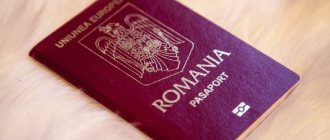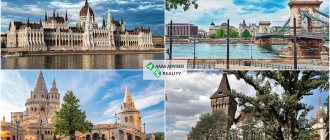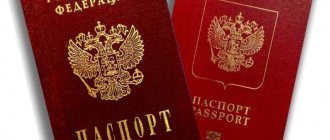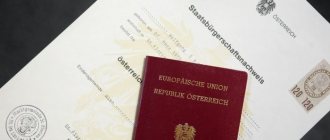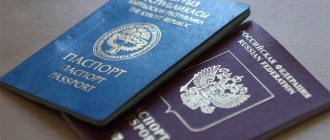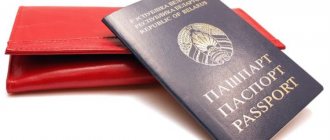Naturalization rules until the end of 2021
So that you can best understand how to obtain Swiss citizenship under the new rules, I will also touch on the legislation in force until the end of 2021, as well as the history of the discussion of the most controversial aspects of the reform in parliament.
The procedure for obtaining Swiss citizenship is considered one of the most difficult in the world. This thesis was true in relation to the old order. It will also continue to be true in 2021.
The legal basis for obtaining Swiss citizenship until December 31, 2021 was the Swiss Federal Law on the Acquisition and Loss of Citizenship, adopted back in 1952, as well as the corresponding laws in force at the cantonal level.
Normal procedure
The usual procedure for obtaining Swiss citizenship has 3 levels : Confederation level, canton level and Gemainde (community) level.
To become a Swiss passport holder, you need to successfully complete all 3 steps. Failure on even one level means failure. The Naturalization and Loss of Citizenship Act of 1952 established the requirements for a candidate precisely at the Confederation level . Additionally, this Law establishes certain legal frameworks for cantonal regulations.
Federation
To be eligible to apply* for naturalization ( application for Swiss citizenship ), the candidate had to satisfy the following federal conditions:
* In the normal procedure, the applicant does not have the right to claim Swiss citizenship. This means that even if he appears to comply with the formal requirements, he may be denied naturalization.
- total residence in Switzerland for a minimum of 12 years *. For persons who lived in the Alpine Republic between their 10th and 20th birthdays, the time spent in Switzerland doubled during this period;
* I often came across a situation where my clients, who had just contacted me for advice, had the misconception that after 12 years, citizenship should supposedly be issued (almost) automatically.
- during the last 5 years – 3 years of continuous residence in Switzerland;
- good level of integration into Swiss society;
- familiarization with Swiss customs, foundations and traditions ;
- respect for the Swiss legal order ;
- there is no threat to the internal and external security of Switzerland from the applicant.
Cantons and Gemeinde
At the cantonal and municipal level, additional requirements for candidates wishing to obtain Swiss citizenship. These requirements (for example, regarding the level of language proficiency, as well as the length of stay in the territory of the canton or municipality) may vary from canton to canton and from Gemainde to Gemainde.
Again, in addition to the requirements established at the Confederation level, the applicant for a Swiss passport must satisfy the requirements of the canton and Geminde of the place of residence (find out why it has become much more difficult to obtain a Swiss passport in the canton of Bern).
Simplified procedure
The simplified procedure provided for significant relaxations regarding the conditions for naturalization. According to them, the formal conditions for obtaining citizenship were as follows:
- The total time of stay in the country is at least 5 years;
- Last year – continuous residence;
- Minimum 3 years – married to a Swiss citizen.
The candidate also had to fulfill certain conditions regarding integration into society.
Reform of naturalization rules
Need for change
Adopted back in 1952, the Swiss Federal Law on the acquisition and loss of Swiss citizenship - even despite numerous additions and changes - has long been considered outdated.
In particular, the rule of 12 years of total stay in Switzerland was criticized formalism The fact is that one foreigner, even after 12 years of residence in the Alpine Republic, may be less integrated into Swiss society than another foreigner after only a few years in Switzerland. Another example concerns cantonal differences. Many politicians pointed out that Swiss citizenship cannot be obtained by those who, due to their profession, must frequently change their place of residence within the Confederation.
To bring the state of Swiss migration law into line with modern realities, back in 2011 the Swiss government presented a draft reform. However, until the summer of 2014, the chambers of parliament (the National Council and the Cantonal Council) continued to play “political tennis”. The latter was expressed in the fact that with enviable consistency they handed each other, like a ball, an updated document for approval.
Chances for success appeared in November 2013, when deputies formed the so-called conciliation commission. She, as many hoped, was supposed to develop a mutually acceptable option by the spring of 2014. True, then there was also no consensus on what is needed to obtain Swiss citizenship. Why?
Initial positions of parliamentarians
By permit C
Permanent residence permit for Switzerland (form for EU/EFTA citizens). Graphics: public domain
For 2011-2014 both chambers were able to develop a common position on the most important point of the reform . If the bill comes into force, only holders of permit C (permanent residence permit) will be able to count on Swiss citizenship.
Until December 31, 2017, there was no such restriction. This meant that holders of permit B or even F still had an open path to a red passport with a white cross. The change in the status quo means that those temporarily accepted and those who do not have a job will remain outside of naturalization*.
* For those without work, obtaining a permit C is not completely excluded. However, since migration authorities usually make negative decisions in such situations, it is only possible to obtain permanent residence by filing a complaint. In one of the proceedings against the migration authority of one of the eastern Swiss cantons, I was able, with reference to the practice of the Federal Court, to successfully justify the need to obtain a permit C for my temporarily unemployed client.
As part of the discussion of the new law in relation to the requirement for permanent residence, Swiss Minister of Justice Simonetta Sommaruga indicated that the reform should establish a regime under which only persons who are well integrated into society will be able to obtain Swiss citizenship. For this purpose, a condition for a permanent residence permit was introduced.
According to the residency requirement
Another important element of the reform - the residency requirement in Switzerland - until recently served as the main bone of contention between parliamentarians. How many years does it take to obtain Swiss citizenship? The Cantonal Council saw the need to lower the threshold from 12 to 8 years. For the National Council, this relief was considered too great. He was ready to give up just 2 years and reduce the minimum length of residence to 10 years.
Two more controversial points were:
- will residence in the status of “temporarily accepted” be counted towards the qualification and
- Will the rule remain that for young people the period of stay between 10 and 20 years is doubled?
The National Council advocated the abolition of these concessions; The Cantonal Council is for their preservation.
Convergence of positions
According to the general residency qualification
Meeting room of the Canton Council, Bern. Graphics: Parliamentsdienste der Bundesversammlung
As is often the case with us, the adoption of a law is achieved by compromise . In this case, the Cantonal Council made a concession to the National Council. By 22 votes to 20, the first spoke in favor of a 10-year residency requirement in Switzerland.
Another concession from the Canton Council was the general requirement of how long a foreigner must live in the territory of the relevant canton in order to satisfy local requirements. According to the agreed version of the reform, the cantons will be able to set a qualification from 2 to 5 years.
By language level
A compromise was also reached on level of language proficiency required to obtain Swiss citizenship. According to the agreed version of the reform, the candidate must be able to communicate well in writing and orally in at least one of the national languages of Switzerland. As a result, language requirements were increased.
According to “double counting” and “temporarily accepted”
It was also possible to reach agreement on the issue of calculating the residence qualification for young people aged 10 to 20 years. And also about whether the period of stay in Switzerland should include the time of residence as “temporarily accepted”.
In relation to the first point, the deputies decided to shift the framework for doubling the calculation of qualifications down 2 years - to 8-18 years. For those “temporarily admitted,” a compromise was reached that their stay in Switzerland would only count half. For more details, see below.
Vote
Meeting room of the National Council, Bern. Graphics: Swiss Federal Parliamentary Service
The final version of the Swiss Citizenship Law in the National Council was voted for by 135 deputies in favor, 60 against, with 2 abstentions; Council of Cantons – 29 “for”, 12 “against” with 4 abstentions.
The Swiss Parliament has thus completed the reform of Swiss migration law regarding naturalization.
No referendum
Any Swiss federal law is subject to an optional referendum. Those. In the case of the Federal Citizenship Law of 2014, there was a possible scenario that it could be rejected in a vote by the Swiss. In this case, the old rules that I wrote about at the beginning of the article could remain relevant in the event of a negative referendum.
However, changing the conditions for obtaining Swiss citizenship found support among the majority of political forces. In the summer of 2014, only the Social Democratic Party allowed the collection of signatures for organizing a referendum against the new law. However, she ultimately left this idea unrealized.
Accordingly, due to the absence of a referendum, nothing prevented the reform from being adopted. Somewhat later, the Federal Council (government) set January 1, 2021 as the date for the new Federal Law to enter into legal force.
Basic methods
In Swiss law, there are not many ways in which you can get your hands on a passport with a white cross. They are fundamentally divided into citizenship by birth and citizenship by naturalization.
Video: let's get to know Switzerland better
Birthright
A child born becomes a Swiss citizen if his father and mother are holders of passports with white crosses. The child will become a Swiss subject even if only one of the parents has Swiss citizenship. A child born to a Swiss citizen also clearly has the right to obtain citizenship of this country, even if he was born in an unregistered marriage or out of wedlock. If the father is a Swiss citizen and officially recognizes his child living with his mother (who is not a Swiss citizen) in another state, then he can officially declare his intention to assume the rights of the father (DNA examination will be required). In this case, the child also receives Swiss citizenship.
When a child is born on Swiss territory, but neither of his parents has citizenship of the Alpine Republic, then in this case he has no prospects of becoming a Swiss citizen. The only positive thing in this case will be the opportunity in the distant future to obtain a visa to Switzerland on the basis of visiting the place of your birth.
When a child is adopted by Swiss nationals, this means that he or she is automatically entitled to Swiss citizenship. But this statement is relevant only for those who have not yet reached the age of majority, which in Switzerland comes at 18 years old.
A child born to a Swiss citizen also clearly has the right to obtain citizenship of this country.
Citizenship by naturalization
It is through naturalization that most foreign citizens acquire Swiss citizenship. Russians and citizens of other CIS countries will be able to apply for a passport of the Alpine Republic only if they have completed all the necessary stages of naturalization. In addition, there is a stable list of persons who should not count on receiving Swiss citizenship at all. It includes:
- foreigners who serve in the army of a foreign country;
- violators of Swiss criminal law;
- foreigners suspected of connections with organized crime or terrorist organizations;
- foreign citizens who have poor integration indicators;
- persons who do not have a sufficient legal level of income.
Marriage to a Swiss citizen
Marriage to a Swiss citizen seems today to be probably the most realistic way to obtain a passport of the Alpine Republic. First, foreign life partners receive a residence permit, which must pass at least two years before receiving permanent residence. After staying for another three years with permanent residence, you can apply for citizenship. During the last year you cannot leave Switzerland, otherwise your period of permanent residence will be reset.
Since we are talking about a calculator, I’ll explain what it is: this is not Germany, where they pay the restaurant bill in half - everything is much worse... Let’s say you moved in with a Swiss: be prepared to pay half the rent, chip in on food, gasoline, etc. P. And, unfortunately, this is not a joke! Our friends live exactly like this: a girl moved to a young man’s apartment, which he had been renting for a year and a half!!!, immediately upon arrival she began paying half the rent (she is also Swiss, so there were no indignant cries about this fact). But the worse thing is that now they have decided to separate, and she did not warn about her departure in advance, so she must pay her share over the next three months, regardless of whether she will live there or not. At the same time, her salary is 5,000 francs, and his is 10,000. And now they have been living together for 2 months, sleeping in the same bed (there is no other one, and no one wants to go to the sofa) and quietly hating each other. He doesn’t want to give in, and she doesn’t want to pay for something she doesn’t use...
Kate_Lausanne
https://www.spletnik.ru/blogs/vokrug_sveta/25434_kak_zhivetsya_v_shvejcarii
It is almost impossible to enter into a fictitious marriage in Switzerland. Any fraud with the intention of obtaining citizenship is immediately stopped by the Swiss authorities. It is not for nothing that a Swiss bank is considered synonymous with reliability. The authorities will strictly control the residence of the young family under one roof. If spouses live outside the Alpine Republic, then it is advisable for them to spend their holidays together in Switzerland and maintain constant communication with friends and neighbors. In short, no one should have any suspicion about the factuality of the marriage. A significant factor will be the opinion of the local community in whose territory the young spouses live. When acquiring citizenship, you will need to receive a reference-recommendation from its administration, which is attached to the basic package of documents.

Marriage to a Swiss citizen seems today to be probably the most realistic way to obtain a passport of the Alpine Republic
My former colleague Vadim told me about the difficulty of obtaining Swiss citizenship. After demobilization, we did not see each other for many years, during which time the former sergeant managed to graduate from university and become a highly qualified software developer. Fate brought him to Switzerland, where he went on a long business trip. I happened to work in Zurich, and on weekends my former colleague liked to travel around Switzerland. Over time, Vadim will even obtain permanent residence. But he doesn’t even hope to become a Swiss citizen. In fact, getting a red passport with a white cross is not just difficult, but incredibly difficult. Although there are official deadlines, a clearly defined residency requirement and other conditions, the acquisition of citizenship is largely hampered by the multi-level nature of decision-making on issuing citizenship to foreigners. Switzerland is not even a federation, but a confederation, where each administrative unit has enormous decision-making powers. If an application for citizenship is granted at the level of the federal authorities, this does not mean that it will be received with a 100% probability. This is just a green light to continue the procedure at the cantonal and community levels. If for some reason the candidacy of a future Swiss citizen is not approved at the cantonal level, which, by the way, may put forward additional requirements, then the issue of citizenship will hang in the air. Community approval will also be required. Sometimes it happens that opinions at different levels do not coincide. In this case, it is unlikely that you will be able to become a Swiss citizen. Vadim, who is already experienced in Swiss realities, considers marriage to be the only real way. In his opinion, only marriage with a Swiss citizen allows you to receive a passport with a white cross with a 100% guarantee after a certain time. When it comes to approval at the community level, the Swiss jealously ensure that the candidate fits the stereotype of the average Swiss. This stereotype arose in the minds of the inhabitants of the Alpine Republic a long time ago and remains largely unchanged for centuries. If a foreigner, for some reason (most likely behavioral), cannot fit harmoniously into the local society, then the chances of his candidacy being approved by the community are reduced to zero. With the introduction of new rules, the already not at all loyal Swiss legislation in the field of immigration and citizenship has become simply draconian.
Real estate and citizenship
Owning real estate in Switzerland in no way becomes a direct basis for claiming citizenship. But at the same time, Swiss real estate ownership gives the right to obtain a residence permit, and then move on to the status of a permanent resident of the Alpine Republic. The minimum requirements for the value of the property are as follows: the property must be residential and cost from 400 to 700 thousand euros (the minimum value is set at the level of each canton). Therefore, having every reason to go through the naturalization process, the owner of Swiss real estate may sooner or later become the owner of a red passport with a white cross.
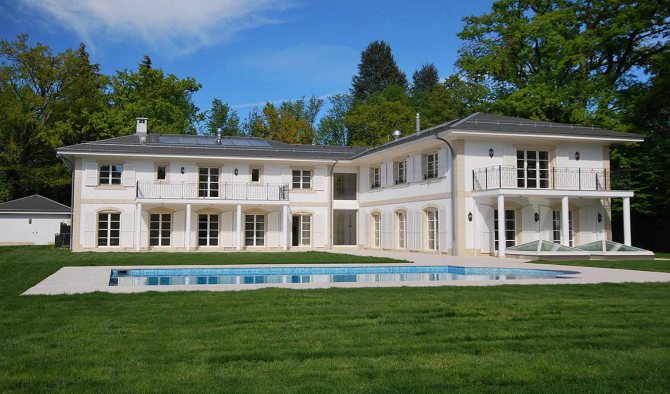
Owning real estate in Switzerland does not in any way become a direct basis for applying for citizenship
Immigration for business representatives and investors
In Switzerland, which controls a third of the world's financial reserves, representatives of foreign business circles are treated coolly. A residence permit can be obtained by investing from 2 million euros, and then proceed to further stages of naturalization, which is quite realistic.
Opening your own company or representative office in Switzerland also becomes a valid reason for obtaining a residence permit. If the company operates stably and efficiently, is profitable, makes all contributions to the federal budget on time, then its owner can renew his residence permit, proceed to obtain permanent residence, and then submit an application for Swiss citizenship.
The population of the relatively small Switzerland, which ranks 133rd in area in the world, is almost 8 million people. A twentieth of Switzerland's area is occupied by Lake Geneva. The confederation has four official languages: German, French and Italian, as well as Alemannic, which is not widely spoken because no more than 5% of the Swiss speak it. The modern name of the state comes from the small canton of Schwyz, which existed at the time of the founding of the confederation and served as a kind of magnet for the annexation of the remaining cantons. Swiss independence is many centuries old; it was proclaimed back in 1291. Switzerland has no official capital. In fact, it is considered Bern, but only because the federal government is located in this city. The Swiss did not become part of the modern European community by speaking out in the referendum against joining the European Union. The Alpine Republic chose the traditional policy of neutrality. But the Swiss considered it expedient to sign the Schengen Agreement.
Swiss laws provide for licensing of almost all types of economic activities. Accordingly, the lack of a license closes the way to providing financial services, practicing law, carrying out insurance or investment activities, or opening a dental or any other medical institution. The Swiss strictly monitor compliance with federal tax laws, therefore, when renewing a residence permit, moving to the next stage of naturalization, and even when acquiring citizenship, it is necessary to have confirmation that the applicant has made all the required contributions to the federal budget of the country on time and in full.

A residence permit can be obtained by investing from 2 million euros (equivalent), and then proceed to further stages of naturalization
Citizenship upon family reunification
Having a citizen of the Swiss Confederation among your close relatives can give you a good chance of getting a passport from the Alpine Republic. There are few such lucky people living in Russia or Ukraine, but they do exist. Close relatives of Swiss citizens invited to live together can count on simplified naturalization. There will be no problem for them in obtaining permission to enter Switzerland, obtaining a residence permit and permanent residence. The naturalization period for foreign relatives will be identical to other categories of applicants for a red passport with a white cross, but their applications will be processed as a priority and, in addition, they will not be required to take an integration test. Unless, of course, foreign relatives have problems with Swiss legislation that arose during their residence in this country.

If you have a citizen of the Swiss Confederation among your close relatives, you can get a good chance of getting a passport of the Alpine Republic
Granting citizenship in a special manner
In some cases, Swiss citizenship may be granted by decision of the federal authorities to foreigners who are recognized as particularly useful for the development of the Swiss Confederation, who have made a significant contribution to improving its international image, and so on. For example, if a foreign athlete wins gold as part of the Swiss team at the Olympics, or a foreign politician defends Swiss interests in the international arena, is an outstanding world-class scientist, etc., then he may be granted Swiss citizenship by a separate decision.
Switzerland is considered the most environmentally friendly country in the world, despite the fact that it is located in the very center of industrial Europe.
Citizenship for refugees
Refugees constitute a separate category of applicants for Swiss citizenship. Becoming a refugee in the Swiss Confederation is very difficult. This will require providing convincing evidence that the forced migrant had to leave his homeland due to persecution by the authorities or organized criminal groups, and the persecution must be systemic and documented. Since Switzerland is not a member of the European Union, Brussels quotas for accepting refugees do not apply to it. But Switzerland is a member of many influential international organizations, and therefore takes part in international programs to support refugees. Previously, refugees could obtain Swiss citizenship 10 years after receiving official status, which shortened their path to a Swiss passport by two years. After the innovations of 2021, the situation has not changed; now the residence qualification for refugees is similar to other categories of immigrants requesting citizenship of the Alpine Republic.
Refugee status is issued to a forced migrant for a period of five years. Next, the Swiss authorities assess the situation in the homeland of the “forced guest.” If they recognize that it is unsafe for him to return there, then the refugee receives the status of a permanent resident of Switzerland. After five years with permanent residence, he can apply for citizenship.
Video: how to become Swiss
Simplified procedure
A foreigner can move to Switzerland and enter into an agreement (Fiscal Deal) with the cantonal administration that he will regularly pay a special tax, called lump sum, over a ten-year period. The annual payment must be more than 150 thousand francs. It is permissible to conclude such agreements with candidates who are over 21 years of age and have no previous problems with the law. For the entire 10 years, an applicant for Swiss citizenship who pays the lump sum tax and is a tax resident of Switzerland has no right to carry out any economic activity for the purpose of making a profit in the territory of the Swiss Confederation. Throughout the entire ten-year period, such candidates for Swiss citizenship are allowed to reside directly on Swiss territory for no more than six months during each calendar year. For lump sum tax payers, after five years with a residence permit (to which they are unconditionally entitled), the opportunity opens up to become permanent residents of Switzerland, but there is no requirement to remain in the country without leaving the country.
The oral test consisted of two rounds and 100 questions. The girl could not explain the initiatives of local authorities to recycle oily waste and remember the names of small shops in her city, since she buys food only in supermarkets. As a result, the commission, consisting of members of the local municipality, refused to obtain citizenship, explaining its decision as follows: “you live in a small world and show no interest in entering into a dialogue with the population of Switzerland.”
Faina
https://realist.online/article/kazhdyj-grazhdanin-shvejcarii-dolzhen-znat-otvety-na-eti-voprosy
Obtain Swiss citizenship from 2021
As usual
General principles
Photo: Marad Widmer
The new law also provides for a three-stage system for obtaining citizenship. Gemeinde, the Federation and the canton must agree to accept the candidate as Swiss citizen.
Important changes under the new law
The most important changes to the federal rules for obtaining Swiss citizenship as usual are:
- The main factor for assessing an application for naturalization should not be how long the foreigner has lived in Switzerland, but how well integrated he is into Swiss society. Good integration means , among other things, respect for the Swiss constitutional order and public order, “economic independence”, as well as the ability to communicate in at least one official language, both orally and in writing. The minimum level of language proficiency itself has also been increased. By the way, spouses and registered partners of candidates will also be required to achieve a high degree of integration.
As you can judge, the above requirements are of a general nature, which leaves the authorities significant freedom to make decisions . In some cases, it is advisable to seek legal assistance. A specialist with a full Swiss legal education based on the practice of the Federal Court can “optimize” the client’s dossier. Such “optimization” in a significant part of cases can increase the chances of obtaining Swiss citizenship and speed up the procedure.
- Requirement to have a permanent residence permit in Switzerland (Niederlassungsbewilligung / permit C). Accordingly, holders of all other residence permits will be left out of naturalization (I will return to the consequences for some categories of foreigners - see below). Details: Residence permit in Switzerland.
- Residence in Switzerland for at least 10 years . In this regard, the Swiss Parliament agreed to soften the previous regime for 12 years.
- Staying on Swiss territory as a “ temporarily accepted ” person will only count 50% towards the 10-year qualification. For example, a person who has lived in the Alpine Republic for 10 years in the status of “temporarily accepted” will, from a formal legal point of view, only be counted for 5 years.
- Staying in Switzerland between the ages of 8 and 18 will count double. The actual residence, however, cannot be less than 6 years. For example, if a minor has lived in the Alpine Republic for 6 years since he was 12 years old, then after reaching 18 years of age he can – subject to other conditions being met – apply for Swiss citizenship.
Cantonal and Gemainde requirements
With the entry into legal force of the new Federal Law, many Swiss cantons had to change their regulations. In some cases, they have taken the opportunity to tighten local regulations . Example:
- Thurgau increases language requirements for naturalization.
It seems impossible to cover all local changes within the framework of this material. In any case, an individual consultation is advisable, taking into account the characteristics of each specific case.
In a simplified manner through marriage
Graphics: Tintazul
As before, the new Citizenship Law does not provide for automatic naturalization by marriage.
To obtain Swiss citizenship through marriage , the candidate must fulfill the following formal conditions:
- have lived in the country for a total of at least 5 years;
- last year – continuously; And
- at least 3 years – married to a Swiss citizen.
Again, the candidate must also fulfill certain conditions regarding integration into society.
Other changes
The format of the article does not allow for a discussion of each of the changes (for example, procedural issues, fees, new exceptions and exceptions to exceptions). Therefore, each specific case must be assessed and – if possible – “optimized” individually.
Swiss citizenship for schoolchildren and students
The new law affected schoolchildren and students
I would especially like to mention the category of schoolchildren and students studying in the Confederation. In the second half of 2021, several students and/or their parents contacted me for a solution to their problem. The latter was that the start of living and studying in their case was in 2013-2015. The initial goal in each case was to obtain Swiss citizenship through study.
What explains the problem?
For study purposes, a foreigner in Switzerland is issued a permit B (in some cases, a residence permit category L). At the same time, in the usual manner, stay on this basis is not counted towards the period for issuing permit C. Accordingly, only after completing training, obtaining a permanent residence permit becomes unavailable.
Up until December 31, 2021, the following situation was still possible. The foreigner spent 12 years here (even despite the usual limit of 8 years) and after that, with his student permit, he successfully applied for Swiss citizenship. However, from January 1, 2021, this option, if not completely eliminated, then becomes significantly more complicated. Reason: mandatory presence of permit C.
This was the problem of those who turned to me for advice: the new law actually cut off their path to Swiss citizenship. Unfortunately, in all cases, clients were misinformed by intermediary agencies that dealt with registration issues at an educational institution. The need to have Permit C was known back in 2013 at the latest. Therefore, I come to the conclusion that the relevant agencies either did not have this information or did not want to share it with their clients. In both cases, the latter made decisions based on incomplete information.
What to do?
Graphic: University of Zurich
Is it possible to obtain Swiss citizenship after studying? Even taking into account the new Law, this option is still not completely ruled out. However, it became, metaphorically speaking, much more tortuous and bumpy.
To increase your chances of naturalization, you should contact a specialist in Swiss migration law as early as possible. Ideally, even before the start of training and even submission of documents. Unfortunately, if seeking advice occurs at a late stage (in extreme cases: a few days before receiving a diploma), then the client himself reduces the choice of various options for action.
It is very annoying, for example, a situation similar to the one that happened to one of my clients. Before contacting me, she studied for 3 semesters at one of the private educational institutions in Switzerland. The beginning of the consultation turned out to be a shock for her: for the purpose of obtaining some concessions on the work permit planned for the future, studying at this private school was not counted. Fortunately, we were able to correct the situation by changing educational institutions. At the same time, the 1.5 years previously spent in the Confederation remained in a sense lost (they could have been used more effectively).
Switzerland dual citizenship
July 31, 2021 Details
The publication is devoted to the question of whether dual citizenship of Russia and Switzerland is allowed. By analyzing current migration laws, as well as the current political situation in countries, we will try to give the most detailed answer to this question.
Can one and the same person simultaneously have citizenship of both the Russian Federation and Swiss citizenship? This issue should be considered with a clear connection to the existing laws of both powers. In relation to the Russian Federation, holders of a Russian passport do not need to renounce their original citizenship if they have become legal subjects of other countries. In this case, it is only necessary to notify the FMS authorities about such a fact (if this is not done within 30 days after receiving a passport from another country, a fine in Russia may be imposed in the amount of about 250 thousand rubles).
As for Switzerland, dual citizenship is allowed here, but there are certain nuances.
Is dual citizenship allowed in Switzerland?
The fact is that for several years in a row, politicians have been trying to revise migration legislation in the direction of tightening it. It is not difficult to guess that this will also affect the possibility of having dual citizenship in Switzerland.
According to representatives of the Swiss People's Party, the opportunity to be a citizen of two countries at once should be prohibited, as this directly harms the state. But not everyone agrees with this statement. Other politicians, on the contrary, are in favor of expanding the scope of this legislation!
Dual citizenship Russia-Switzerland
At the moment, dual citizenship between the Russian Federation and Switzerland is working, but no one knows exactly what may happen in the future. But even now, holders of two passports at once - Swiss and, for example, Russian in the Alpine country enjoy a certain kind of mistrust. For example, such people are prohibited from holding positions in the diplomatic services or senior positions in the civil service. By the way, a separate group of politicians is in favor of lifting these restrictions, but a solution has still not been found!
Thus, if you are a current citizen of the Russian Federation, and at the same time you received a Swiss passport, you can enjoy all the benefits of dual citizenship. But, if migration laws in Switzerland become more radical, most likely you will have to choose which country’s passport to keep and which citizenship to officially renounce!
Some general questions
Switzerland and dual citizenship
Both before and after 1 January 2018, Switzerland allows dual citizenship . In other words, obtaining a Swiss passport does not in itself entail the need to renounce your previous citizenship.
At the same time, it is important to take into account that the refusal of the previous passport may be dictated by another state itself, which allows only one citizenship. In this case, when you receive a Swiss passport, you will have to give up your previous one. Otherwise, sanctions (including criminal penalties) must be taken into account.
“Buy Swiss citizenship by investment”
Graphics: www.business-swiss.ch
Surprisingly, there are sometimes advertisements on the Internet about the opportunity to buy Swiss citizenship by investment. Sometimes they even indicate how much it costs.
The whole paradox of the situation boils down to the fact that this option does not exist. There is no legal basis for issuing a passport for money. Accordingly, any intermediary offering to “ buy a Swiss passport for investments, for real estate , etc.” is a scammer.
So, you cannot pay for Swiss citizenship! However, in a sense, you can “buy” a residence permit. This operation has a basis in law. And for it, a legal instrument is most often used, called lump-sum taxation .
- Details: Lump sum tax in Switzerland.
Swiss citizenship for a citizen of the Russian Federation, Ukraine, etc.
Graphics: www.business-swiss.ch
You can often hear the question of how to obtain Swiss citizenship for a citizen of the Russian Federation/Russia and what are the features . Similar questions may arise from citizens of Ukraine and other post-Soviet countries.
Many people know that when issuing a work residence permit, the Confederation looks at the citizenship of a foreigner. However, for the naturalization procedure, all the rules I listed above apply equally to everyone, regardless of previous citizenship. Therefore, the conditions do not differ either for Russians, or for Germans, or for anyone else.
“Citizenship if born in Switzerland”?
You can only obtain Swiss citizenship by birth if at least one of your parents is Swiss. If this condition is not met, then automatic naturalization is not possible (with 2 exceptions, which in practice are of little importance).
Therefore, if you give birth to a child in Switzerland , then he will not acquire a Swiss passport only due to this circumstance.
Ways to obtain citizenship
After the amendments come into force, the general rules for acquiring Swiss citizenship will remain the same. Obtaining the coveted passport is permitted only through legal means. You cannot buy the document. Special investment programs do not work in the republic either. You can obtain Swiss citizenship:
- Born into a family where one of the parents is Swiss. Parents are not required to be married. But if the father is a citizen of the country, official recognition of paternity is required. Children of Swiss mothers are issued passports automatically.
- Minors from other countries adopted by Swiss citizens.
- Naturalized foreigners. There are two types of naturalization – regular and simplified.
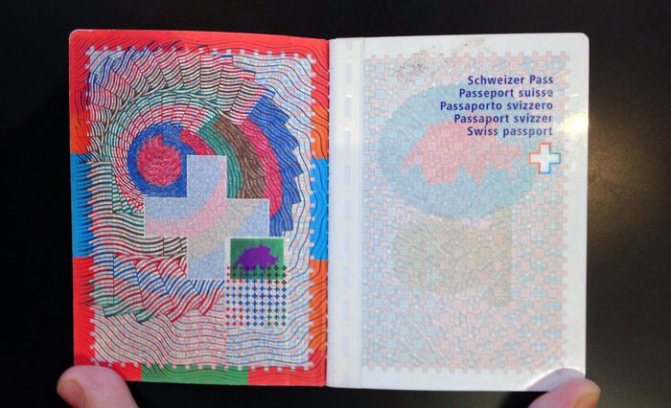
Today, the interior design of a Swiss passport is considered one of the most beautiful in the world.
Beware of incorrect information!
Many materials on how to obtain Swiss citizenship will become outdated with the entry into force of the new law. Fortunately, these materials can be filtered by the date of their publication.
The situation is much more problematic with materials that were allegedly written taking into account the new law, but which contain errors. Unfortunately, I have already encountered errors when reading articles on other resources.
With this in mind, everyone should understand that actions taken based on incorrect information may delay the process of obtaining Swiss citizenship. In the worst case, naturalization will become completely unavailable.
Author: Marad Widmer , LL.M. (Genf), Bachelor and Master of Swiss Law, practicing Swiss lawyer, founder of Marad Widmer Rechtsberatung. Member of the Swiss Lawyers' Union (SJV/SSJ/SSG). Member of the Friends Club of Liberales Institut (Zurich).
This material provides an excursion on how to obtain Swiss citizenship under the new rules, starting from January 1, 2018. The information contained is for review and is not intended to replace full legal advice. Only within the framework of such a consultation is it possible to assess the situation based on specific circumstances and “optimize” the dossier of an applicant for a Swiss passport.
